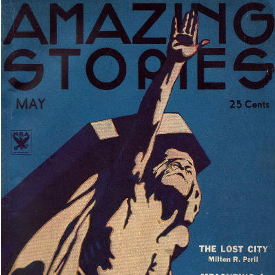Marketing. Is there any other word that instills more fear in a writer? I don’t think so. When authors talk about marketing, here are the things commonly mentioned:
- I’m an introvert; I don’t want to market
- I just want to write; I don’t want to market
- I don’t like pestering people; I don’t want to market
Hmm…I’m seeing a trend. So we know what authors don’t want, but what do they want? Common answers include:
- I want people to read my work
- I want to quit my day job
- I want more time to “just write”
The problem, of course, is in one is a prerequisite to the other. Marketing leads to people reading your books. If they like your books they tell others. If enough people buy, you can quit your day job and get an additional 8 – 10 hours to devote to writing more books.
Like some of my other regular posts such as Demystifying Contracts and Pulling Back the Publishing Veil, I’m going to start a series of posts about marketing and authorship.
So for my first post I thought I would start with a very basic premise…how you need to adjust your thinking in order to be successful.
It’s going to fall to you
One of the most commonly cited reasons that some authors choose traditional publishing is the notion that this route will somehow absolve them from any marketing responsibilities. If you want to be successful, then let’s dismiss this misconception right from the get go. To me, I don’t care which way you publish, self, small press, or big-six, the bulk of marketing is still going to be left to you.
The fact is that marketing support from a publisher will vary wildly: from none at all, to including your book in a catalog used to sell titles to corporate buyers, to full campaigns. For new authors, especially those with a low advance, you will probably be on the “not much or none” side rather than the “full campaign” option.
I’m very fortunate. Not only am I traditionally published, but I’m also with a publisher who understands the importance of marketing. What’s more, I sell fairly well, which means I get a nice-sized marketing budget. I have two books coming out soon (Aug 6 for The Crown Tower and Sep 17 for The Rose and Thorn) as such Orbit has started their marketing campaign for these books. We have a lot of great things coming, but here’s the thing. That marketing is going to be concentrated on the time leading up to the release. After that, the marketing department has to move on to the books that coming out the next month, and so on. Even a publisher who does a good job with marketing has limited resources and they have to divide those resources between many authors. Those who sell more than you will get bigger budgets and more attention. The fact is that you…and only you..can be 100% dedicated to your projects.
Early adopters
The publishing business isn’t easy. In fact it is hard…really…really…hard. To write a book worthy of publication is no small feat. You’ve likely poured yourself into for months or years and pinned many hopes to it of becoming “a real writer” (whatever that definition means to you). But the reality is that is only part of the battle. The best book in the world will go nowhere if no one knows it exists. Marketing, as much as you may despise that concept, is necessary to get those all important initial readers. Once you get people to read the book, it will be up to the power of your story, and how much you entertained, moved, or affected a person that will determine whether it spread by that all-important word of mouth. But without those first early adopters your book is indeed that tree falling in the forest with no one to hear.
The good news is that today, more than ever, there are many avenues to find these first readers to prime the pump. I’ll be covering some of those in future Marketing 101 posts.
Telling people about the existence of something they want isn’t pestering.
I think part of the problem, is that many new authors take a shotgun approach. It’s somehow easier to make a broad based comment on twitter rather than a more focused approach to their direct audience. The former doesn’t sell books and is indeed an annoyance…so why do that? Again, well go in more detail in future posts when we have more room for detail. But let’s just take a simple example. Let’s say you’ve written the next dark and gritty epic fantasy book. Don’t you think that it would be likely that people who enjoy Mark Lawrence’s Prince of Thorns or Joe Abercrombie’s First Law would desire to find more books like that? Of course they do. And it’s easy to find these people. Just go to goodreads and you’ll find thousands of people who have read those books. Approaching them (if done properly), won’t be looked upon as a nuisance…they’ll thank you for bringing a book that they are predisposed to, to their attention.
Just as with writing a book, it’s all about execution. So how you approach people is very important…but for now…why not start compiling a list of goodreads people who would be a good candidate for you book. Later we’ll show you what to do with that list.
Even introverts can interact on line.
“Selling” in person is hard. You have to think on your feet, and you’ll experience first hand the sting of rejection. It’s hard to remember all the things you want to say about your book and get it out without tripping over your tongue or leaving something out. Not to mention the fear that they may ask something you don’t have an answer for right that second. I can understand why this scenario would be a problem…even if your not an introvert.
But the beauty of the internet is it’s so much easier than that. You can carefully plan what you are going to say ahead of time. As previously mentioned, you can engage with people who you already know are interested in your kind of books. Lastly, you’ll rarely experience any type of direct rejection. If they aren’t interested, they just won’t buy. Only if you are behaving badly will you get negative responses from a carefully crafted outreach. And if you do get such a response, then you’ve learned where the boundary is and you can adjust you approach in the future.
Inform rather than push
Nobody likes the “hard sell,” and yet it must still work in many cases as it is a very common technique (or those people just haven’t caught on how inefficient it is). But, this is good news because the “right attitude” doesn’t require a hard sell. Your job is simply to let people know what you have to offer, make it easy for them to take a look, and then let them decide for themselves. Now that doesn’t sound too hard…does it?
Rather than saying, “buy my book” doesn’t it make more sense to mention you have a book, provide a quick enticing description, and provide them a link to a sample chapter or two? If your writing is good, and you are approaching the right people, this WILL work, and it really is pretty painless to do.
Summary
Fear of the unknown is a natural reaction. But none of us are too old of dogs not to learn new tricks. If your dream really is to be able to quit your day job, craft your tales, and connect with readers then you owe it to yourself not to sabotage that goal by failing to market. The way I look at it, if my books fail because people read them and are not entertained, well that is one thing. But if I fail because no one knew my books existed in the first place, then shame on me. I failed to take control of my own destiny and yes I have no one to blame but myself. Yes, you can find an point to some examples where people became successful without doing marketing. But this is an extremely rare situation, and it’s a bad idea to count on such random and unpredictable events. I’m all about “maximizing my chances of success” and to do that requires a plan, professional execution, and hard work. After all you’ve gone through to create your books, don’t they deserve a fighting chance at finding readers who will love them as much as you do?
Michael J. Sullivan is a speculative fiction writer who has written twenty-five novels and released nine. Eight of his fantasy books (The Riyria Revelations, and The Riyria Chronicles), were published by Hachette Book Group’s Orbit imprint. Hollow World, a science-fiction thriller was released by Tachyon Publications. The first four books of his new series, The First Empire, has sold to Random House’s Del Rey imprint, and the first book is scheduled to be released in the summer of 2016. He can be found on twitter, through his blog www.riyria.com, and on his facebook page and his publisher’s page for the series.










Recent Comments